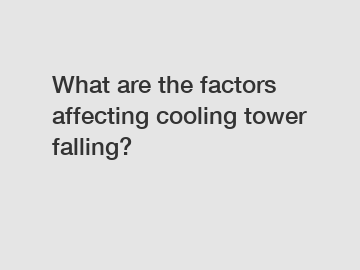What are the factors affecting cooling tower falling?
Apr. 04, 2024
Cooling towers are essential components of many industrial processes, providing a means to remove excess heat from systems and maintain optimal operating temperatures. However, cooling tower falling can occur due to various factors, leading to potential safety risks and operational disruptions. Understanding the factors affecting cooling tower falling is crucial for preventing accidents and ensuring the efficient functioning of these important structures.
Corrosion.
Corrosion is one of the primary factors affecting cooling tower falling. Over time, exposure to water and environmental factors can cause structural components of the cooling tower, such as the support beams and framework, to deteriorate. Corrosion weakens the integrity of the tower, increasing the risk of collapse. Regular inspections and maintenance are essential to identify and address corrosion issues before they compromise the safety of the cooling tower.

Poor Maintenance.
Inadequate or irregular maintenance is another common factor contributing to cooling tower falling. Without proper upkeep, cooling towers can experience a range of issues, such as clogged filters, malfunctioning fans, and leaky pipes. These problems can strain the structural components of the tower and make it more susceptible to failure. Routine maintenance, including cleaning, lubrication, and inspection, is crucial for ensuring the safety and efficiency of cooling towers.
Overloading.
Overloading is a significant factor that can lead to cooling tower falling. Exceeding the maximum load capacity of a cooling tower, whether intentional or unintentional, can put excessive stress on the structure and cause it to collapse. Factors such as adding additional equipment, increasing water flow rates, or conducting maintenance work without proper precautions can contribute to overloading. It is essential to adhere to the recommended load limits and consult with structural engineers when making modifications to cooling tower systems.
Foundation Issues.
Issues with the foundation of a cooling tower can also result in structural instability and potential falling. Uneven settling, soil erosion, or poor construction can compromise the stability of the tower and lead to structural failure. Regular monitoring of the foundation, including inspections for cracks, shifting, or sinking, is crucial for detecting potential issues early and implementing corrective measures to prevent falling.
Extreme Weather Conditions.
Extreme weather conditions, such as strong winds, heavy rain, or snowstorms, can also impact the stability of cooling towers. Severe weather events can exert additional stress on the structure, potentially causing it to topple over. Proper design considerations, including wind load calculations, anchoring systems, and reinforcement measures, are essential for ensuring that cooling towers can withstand adverse weather conditions and maintain their structural integrity.
Conclusion.
In conclusion, several factors can contribute to cooling tower falling, presenting safety hazards and operational challenges for industrial facilities. To prevent accidents and maintain the efficiency of cooling tower systems, it is essential to address issues such as corrosion, poor maintenance, overloading, foundation problems, and extreme weather conditions. Regular inspections, proper maintenance practices, and adherence to safety guidelines are key to ensuring the safe and reliable operation of cooling towers.
If you require further information or assistance with cooling tower maintenance and safety, please feel free to contact us.
If you are looking for more details, kindly visit motor for cooling tower fan, motor cooling tower, crossflow head vs counterflow.
224
0
0
All Comments (0)
If you are interested in sending in a Guest Blogger Submission,welcome to write for us!


Comments